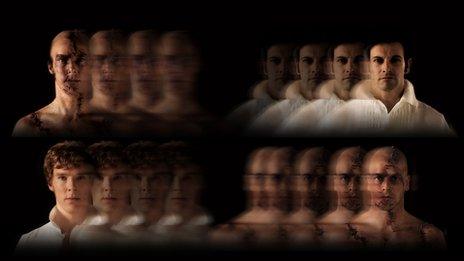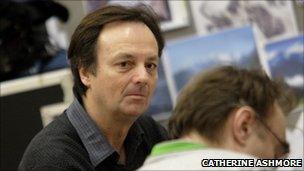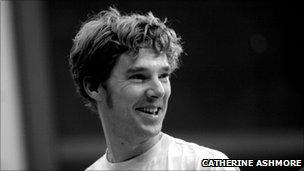Frankenstein: The Creature speaks
- Published

Benedict Cumberbatch and Jonny Lee Miller alternate in the lead roles
As Frankenstein previews at the National Theatre, its writer Nick Dear talks about giving Mary Shelley's creation back his voice.
"We haven't got any eight-foot monsters," says Nick Dear, of his 21st Century version of the Gothic classic that opens in London next week. "We are working very much to a human scale."
The new production sees Benedict Cumberbatch and Jonny Lee Miller alternate in the roles of Victor Frankenstein and The Creature on different nights.
It also marks director Danny Boyle's return to the theatre after his films Slumdog Millionaire and 127 Hours.

Nick Dear began working on Frankenstein 20 years ago
Mary Shelley began writing the story of Frankenstein when she was just 18 years old. The novel was published anonymously in 1818, and quickly found its way into theatres in the 1820s.
There have been almost 100 theatrical and film adaptations since, with Frankenstein's creature played - among others - by Boris Karloff, Christopher Lee, Dave Prowse and Robert De Niro.
"We all think we know the story," says Dear, "but that's mainly to do with knowing the movies. Most of the movies have a very different agenda."
Dear and Boyle began discussing the idea of staging Frankenstein in the early 1990s while working together on The Last Days of Don Juan at the Royal Shakespeare Company.
Dear worked on some early drafts, but the project was shelved when Kenneth Branagh's film came along in 1994. "I kept it on the backburner and Danny went off and became very famous," says Dear, whose theatre credits include The Art of Success and Power.
The project was rejuvenated in 2004. "I knew I wanted to do Mary Shelley's book justice. The book has a catalogue of ideas stemming from the radical philosophy of the time it was written. I wanted to put that on the stage, not to focus on the scary horror elements of it.
"We keep it roughly in period, the story doesn't in any major sense deviate from what she wrote, though I've had to cut great chunks of it.
"My hope is that if Mary Shelley popped into row G in the stalls she'd recognise what she wrote."
Desire for revenge
At the heart of of Shelley's story are themes of scientific responsibility, parental neglect and the nature of good and evil.
But the eloquent creature of Shelley's story is, in many movies, reduced to a lumbering, inarticulate monster.
Dear points out the novel contains a 40-page monologue where the creature describes his coming to life, education, growing sense of injustice - and desire for revenge.

Benedict Cumberbatch, seen here in rehearsals, was at the NT last year in After The Dance
"The book is very specific - his lifespan is three years. We begin on day one. We decided that we would would give the creature his voice. There is a degree of grunting, but we also show him acquiring language and developing articulacy.
"The creature starts out trying to do good but everywhere he turns he's abused and victimised and driven out of society, and eventually this turns him vengeful."
What themes resonate now with modern audiences?
"I think of it as a creation myth for the science age," says Dear. "Other ideas about creation are all predicated on a deity of some kind which brings people into being.
"At the heart of this story we see the moment in our history when God is thrown away and humankind takes control - and things go badly wrong. It's a rich story because we have an innate fear of what technology can do."
'Spare and controlled'
The idea of the swapping the lead roles came from Boyle after Dear had begun writing. The extra work involved has led to a longer-than-normal preview period with extra technical rehearsals.
Dear admits: "There's a huge logistical implication, but it gives us all sorts of richness that we perhaps weren't expecting."
Stephen Hebron talks to Will Gompertz about how Mary Shelley wrote Frankenstein
The National Theatre will screen two separate performances of Frankenstein in cinemas next month. Audiences will be able to see both actors as Victor and The Creature in broadcasts a week apart.
What's been the hardest part of bringing Frankenstein to life on the stage?
"The 147 drafts!" laughs Dear.
He adds: "The hardest part has been trying to find the real heart of Mary Shelley's story and abandon the rest. I didn't want to write a Dickens epic. I wanted it to be quite spare and controlled.
"We have a show that's two hours and no interval - it's like a big movie, really."
Frankenstein opens at the National Theatre on 22 and 23 February. The cinema showings take place on 17 and 24 March.
- Published30 November 2010
- Published14 February 2011